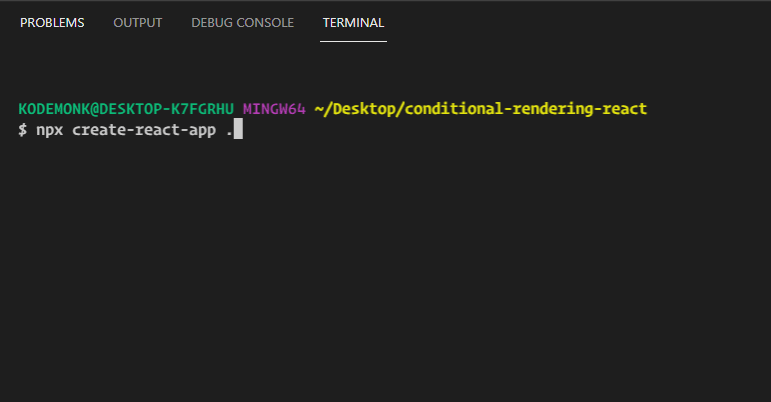This content originally appeared on DEV Community and was authored by Abayomi Ogunnusi
This is one of the concepts I found most confusing when I started React. This post is a simple demonstration of how to render components with react using conditional rendering.
Let's get to it
🥦 Create a react project using npx create-react-app .
🥦 Then start the react app using this command: npm start, this opens up the react page on the default localhost:3000
Clean Up
Next, we cleanup our src folder and just have a h1 tag inside the App.jsthat says Choose your favorite pet.
import logo from "./logo.svg";
import "./App.css";
function App() {
return (
<div className="App">
<h1>Choose your favorite pet</h1>
</div>
);
}
export default App;
🥦 Let's give this a well.
Our result:
🥦 Next, we create a component folder and a file, I call it Choose.jsx. You can call it whatever you like.
- Create a component
import React from "react";
export const Choose = () => {
return (
<div>
<p>I am a cute Dog</p>
<img
src="https://www.google.com/url?sa=i&url=https%3A%2F%2Fwww.countryliving.com%2Flife%2Fkids-pets%2Fnews%2Fa44032%2Fdog-owners-take-more-pictures-of-their-pet-than-their-spouse%2F&psig=AOvVaw1qbUbk4x640915cLFiHmZ0&ust=1642064745637000&source=images&cd=vfe&ved=0CAsQjRxqFwoTCMDU14Duq_UCFQAAAAAdAAAAABAJ"
alt="cute dog"
/>
</div>
);
};
🥦 Now let's import our Choose.jsx into the App.js component.
import "./App.css";
import { Choose } from "./components/Choose";
function App() {
return (
<div className="App">
<h1>Choose your favorite pet</h1>
<Choose />
</div>
);
}
export default App;
You should have the following on save:
🥦 Now let's write the logic that toggles our dog into a cat.
import useState Hook and declare an initial value for your useState.
import { useState } from "react";
import "./App.css";
import { Choose } from "./components/Choose";
function App() {
const [toggle, setIsToggle] = useState(false)
return (
<div className="App">
<h1>Choose your favorite pet</h1>
<Choose />
</div>
);
}
export default App;
🥦 Next, we create a button with an onClick function, and we tell it to change the setToggle state to true
import { useState } from "react";
import "./App.css";
import { Choose } from "./components/Choose";
function App() {
const [toggle, setIsToggle] = useState(false);
return (
<div className="App">
<button onClick={() => setIsToggle(!toggle)}>Change</button>
<h1>Choose your favorite pet</h1>
<Choose />
</div>
);
}
export default App;
🥦 Now, whenever we click our button, the value of our toggle is set to the inverse of its initial value.
Let me show you how this works by adding a console.log to the isToggle variable.
import { useState } from "react";
import "./App.css";
import { Choose } from "./components/Choose";
function App() {
const [toggle, setIsToggle] = useState(false);
return (
<div className="App">
<button onClick={() => setIsToggle(!toggle)}>Change</button>
{console.log(toggle)}
<h1>Choose your favorite pet</h1>
<Choose />
</div>
);
}
export default App;
🥦 If you open your developer console by pressing f12 or use the inspect we have:
Now, using ternary operators, let's build a conditional rendering that says, "Render my lovely dog or give me a cat."
🎯 Method 1: Inline If with Logical && Operator
import { useState } from "react";
import "./App.css";
import { Choose } from "./components/Choose";
function App() {
const [toggle, setIsToggle] = useState(false);
return (
<div className="App">
<h1>Choose your favorite pet</h1>
<button onClick={() => setIsToggle(!toggle)}>Change</button>
{toggle && <Choose />}
</div>
);
}
export default App;
Explanation:
{toggle && <Choose />} this means if toggle is true, render component.
🎯 Method 2: Inline If-Else with Conditional Operator
Let's bring our cat into the picture by declaring that if we can't choose between a dog and a cat, we'll take a cat.
In the Choose.jsx file, quickly develop and export a working component.
export const Cat = () => {
return (
<div>
<p>I am a cute Cat</p>
<img
src="https://th-thumbnailer.cdn-si-edu.com/ZoiTX0zdWNy5LOUC6Yh-qQsDcsE=/fit-in/1072x0/filters:focal(1834x1782:1835x1783)/https://tf-cmsv2-smithsonianmag-media.s3.amazonaws.com/filer/11/2c/112cfb7f-d73f-40d6-afab-7e05be7c7b73/andy_warhol_ch_6.jpg"
alt="cute cat"
width="500px"
height="380x"
/>
</div>
);
};
Now let's import it into our App.js
import { useState } from "react";
import "./App.css";
import { Cat, Choose } from "./components/Choose";
function App() {
const [toggle, setIsToggle] = useState(false);
return (
<div className="App">
<h1>Choose your favorite pet</h1>
<button onClick={() => setIsToggle(!toggle)}>Change</button>
<Cat />
{toggle && <Choose />}
</div>
);
}
export default App;
Our final code
import { useState } from "react";
import "./App.css";
import { Cat, Choose } from "./components/Choose";
function App() {
const [toggle, setIsToggle] = useState(false);
return (
<div className="App">
<h1>Choose your favorite pet</h1>
<button onClick={() => setIsToggle(!toggle)}>Change</button>
{toggle ? <Choose /> : <Cat />}
</div>
);
}
export default App;
This is where the magic happens {toggle ? <Choose /> : <Cat />}.
Here, we are saying if toggle is true render which is our dog and if not render cat.
I hope you found this article useful.For reference, you can find the entire code here click. Thanks
Resources
This content originally appeared on DEV Community and was authored by Abayomi Ogunnusi
Abayomi Ogunnusi | Sciencx (2022-01-12T10:34:13+00:00) React: Conditional rendering. Retrieved from https://www.scien.cx/2022/01/12/react-conditional-rendering-5/
Please log in to upload a file.
There are no updates yet.
Click the Upload button above to add an update.




